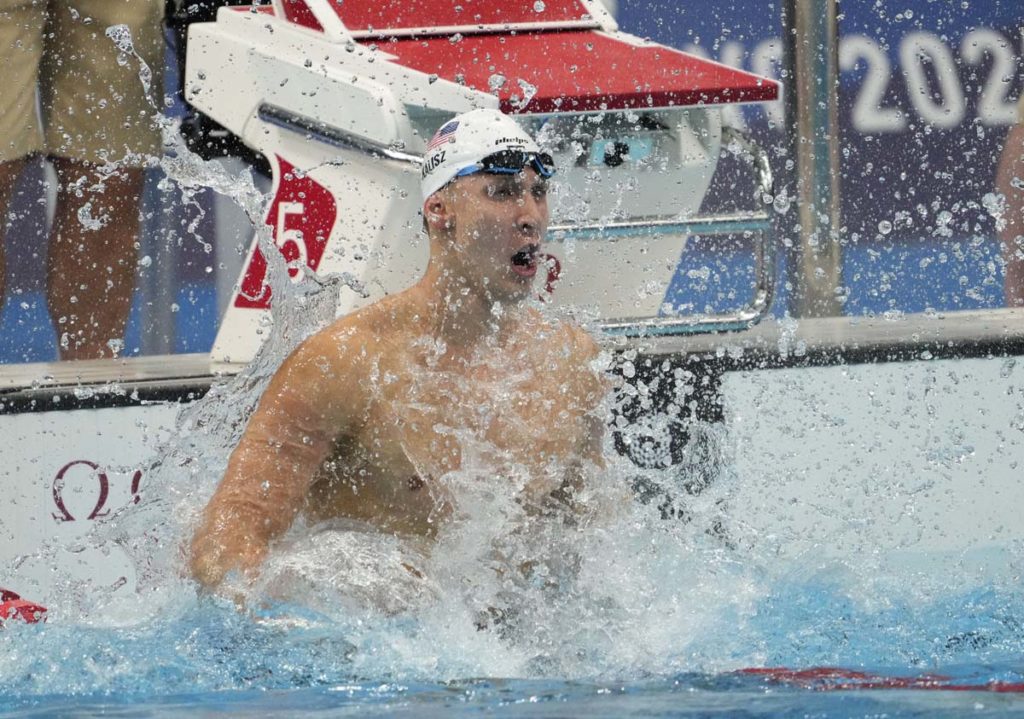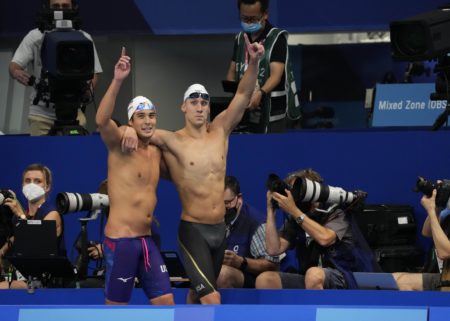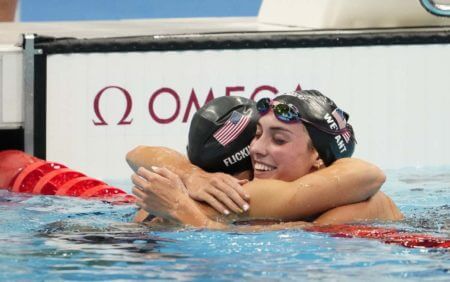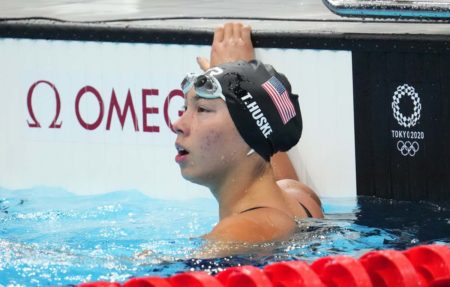Olympics: United States Overcomes Apparent Weakness for Hot Start in Tokyo

Editorial content for the 2021 Tokyo Olympic Games coverage is sponsored by GMX7.
See full event coverage. Follow GMX7 on Instagram at @GMX7training #gmx7

Olympics: United States Overcomes Apparent Weakness for Hot Start in Tokyo
It would have been easy to excuse a slow start for Team USA on day one. Coming out of Olympic Trials, the team had significant weaknesses across various events, particularly on the men’s side. The U.S. men won medals in all but one individual event at the Rio Olympics in 2016, but heading into Tokyo, there were only four men that looked like favorites to reach the podium individually. And if the U.S. was going to earn its typically-hefty medal haul, it likely would not come until later in the meet when Katie Ledecky and Caeleb Dressel got into the heavy portions of their event schedules.
Well, it’s day one, the Americans have six medals, and neither Ledecky nor Dressel have touched the pool yet. Basically everything that could go right has gone right.

Jay Litherland, left, and Chase Kalisz — Photo Courtesy: Rob Schumacher — USA TODAY Sports
The very first final was the men’s 400 IM, where pre-meet gold-medal favorite Daiya Seto did not qualify for the final. So Chase Kalisz took advantage of the opportunity and swam away from the field to earn his first Olympic gold. American teammate Jay Litherland stayed within striking distance of the field and then used his patented monster finish to edge out the field and take silver medal, reinstating the tradition of American 1-2 finishes in the event after previously achieving the feat in 1996, 2000 and 2004.
Kalisz’s gold-medal winning time of 4:09.42 was off his season-best timeof 4:09.09 and slower even than Brendon Smith’s top qualifying mark out of prelims (4:09.27). Litherland’s final time was 4:10.28, which was slower than all eight qualifiers out of prelims—and it was good enough for the silver medal! Nothing matters at the Olympics except racing and places, and Kalisz and Litherland were the superior racers in the first final. And that race set the stage.
Next up was the men’s 400 freestyle, where the Americans were the butt of some jokes after only one swimmer cleared the FINA “A” standard in the event in the Olympic Trials final. Well, six weeks later, two American men swam in that Olympic final, and Kieran Smith ended up with a bronze medal.
Five men in that final have recorded quicker times this year than Smith, and not just surprise gold medalist Ahmed Hafnaoui of Tunisia and silver medalist Jack McLoughlin of Australia. Elijah Winnington still has the world’s fastest time, and both Henning Muhlleitner and Felix Aubock were quicker than Smith’s bronze medal time in prelims.
Doesn’t matter. It’s the Olympics. You race, you get your hand on the wall, and that determines how history remembers you.
And then in the women’s 400 IM, Americans Emma Weyant and Hali Flickinger swam inspired by the efforts of their male counterparts.
“When we saw that happen, we looked at each other and said, ‘it is our turn,’” Weyant said. Flickinger added, “We were ready to go and do it for the U.S.”

Hali Flickinger, left, and Emma Weyant embrace after the 400 IM final — Photo Courtesy: Rob Schumacher — USA Today Sports
Japan’s Yui Ohashi pulled away from the field to secure the gold medal, but Weyant swam her second lifetime best in as many races to take silver. Her time of 4:32.76 is elite by any measure, and she now ranks 17th all-time in the event, fifth ever among Americans. And then Flickinger fought tooth-and-nail on the freestyle leg to get past defending gold medalist and world-record holder Katinka Hosszu, then hold off 2016 bronze medalist Mireia Belmonte to secure the bronze medal. Once again, everything was breaking the Americans’ way.
The only slight disappointment in a final on day one came in the women’s 400 freestyle relay, when the U.S. women just missed out on a silver medal, finishing 0.03 behind Canada to claim bronze. Erika Brown was not great on the leadoff leg with her 54.02 (a half-second slower than she swam at Olympic Trials), but Abbey Weitzeil, Natalie Hinds and Simone Manuel all delivered. They were more than a second and a half slower than the American record from the 2019 World Championships, but even with a perfect race, this group was never going to touch Australia for the gold medal.
The post-day one finals message to American fans could have quite feasibly been, “don’t panic yet,” with stronger events and potential momentum-builders to come over the next few days. Instead, every American swimmer in the pool took full advantage of their opportunity in an Olympic final to completely flip the narrative. That resulted in the aforementioned six medals, the most medals an American swim team has won on day one of an Olympics since at least 1960.
Not quite a “don’t panic” situation.

Torri Huske after the women’s 100 fly semifinals — Photo Courtesy: Robert Hanashiro — USA Today Sports
Now, the task turns to keeping that positive wave rolling. Looking ahead to day two finals, American hopes have dipped slightly in the women’s 100 butterfly and men’s 100 breaststroke as Torri Huske and Michael Andrew, both popular medal picks prior to the Games, have not swum close to their best times, and both qualified fifth for Monday morning’s finals. Ledecky will make her debut at these Olympics in an anticipated showdown with Australia’s Ariarne Titmus in the women’s 400 freestyle, while Dressel figures to lead the U.S. men against Russia in the men’s 400 free relay. Those last two races should produce American medals, but gold is a question mark, at least on paper.
But maybe that’s the biggest takeaway from day one, that times on paper do not tell the full story of what will happen in an Olympic final. There are the intangibles to consider, and clearly, the Americans have that going in their favor right now, despite any and all flaws that looked evident in the weeks prior.
Prior to the start of the Games, Swedish Olympian and Cal swimmer Bjorn Seeliger captured a video in the Olympic village of Dave Durden, his college coach and the head coach of the U.S. men, leading the American team in a rendition of “America the Beautiful.” The team was huddled in a circle with arms around each other as Durden encouraged them to sing louder and with more energy.
Team USA took that mojo and inspiration and brought it to the pool on day one. If they can keep it going throughout this week of Olympic swimming, this much-scrutinized team could end up delivering yet another signature performance in the pool in Tokyo.




